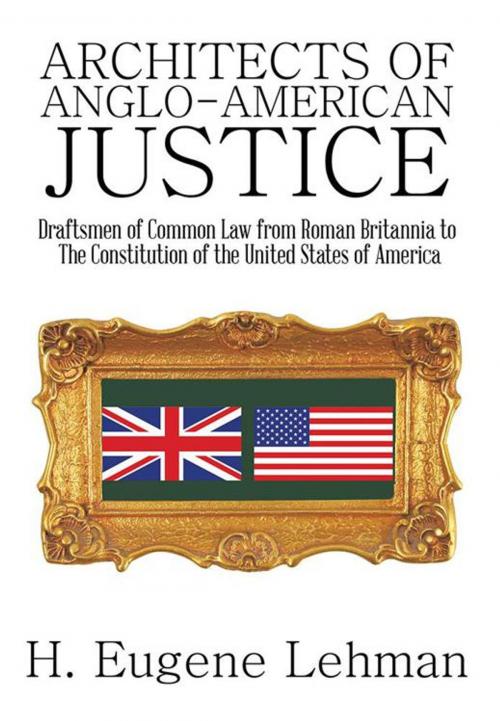| Author: | H. Eugene Lehman | ISBN: | 9781496925282 |
| Publisher: | AuthorHouse | Publication: | August 6, 2014 |
| Imprint: | AuthorHouse | Language: | English |
| Author: | H. Eugene Lehman |
| ISBN: | 9781496925282 |
| Publisher: | AuthorHouse |
| Publication: | August 6, 2014 |
| Imprint: | AuthorHouse |
| Language: | English |
This book traces the history of English law and government for fourteen centuries, from the withdrawal of Roman Legions from Britannia to separation of Englands New World colonies and the ratification of the Constitution of the United States. The governments of the United States and Great Britain, although separate now for over two centuries, share a deep common heritage. The starting point for American legal history goes back to the roots of English common law. This narrative follows the evolution of Anglo-American common law. The chapters are arranged as a collection of brief biographies that credit in chronological order the individuals whose contributions to law and justice helped to create the tranquil civil world most of us enjoy today. The model for English colonial government in the New World was the common law that had evolved over centuries in England. In much of history, laws were created to protect the wealth and power of those who enjoyed social privilege. Gradually, equity and justice in the protection of basic human rights of common mankind became compelling concerns of law and government. Slowly, even the rights of minorities whose members differed from the mainstream in language, religion, culture, and ethnicity became a concern of justice. Each upward step in legal equity has been a move from injustice to a little less injustice. The evolutionary path toward greater justice has had its ups-and-downs. Reverses in justice occurred with the Anglo-Saxon invasion after the fall of Ancient Rome, with the Norman Conquest of 1066, in the Wars of the Roses, and in the vain self-serving reign of Henry VIII. Periods of notable advance in the history of law came with personal contributions of Alfred the Great, Henry Plantagenet, Simon de Montfort, Edward Longshanks, Good Queen Bess, Thomas Egerton, Edward Coke, Oliver Cromwell, and Founding Fathers of the United States Constitution. All these events are revisited. The author has expressed original opinions and explanations of the record that will disagree in some instances from interpretations of these events here by others. The author hopes that this informal telling of a story, will contribute to an appreciation that living today in an enlightened time that aspires to provide equal justice for all under common law is far superior to tribal life in a far distant Dark Ages when might-made-right and getting-even was the accepted goal of justice by tribal barbarians. H. Eugene Lehman, Chapel Hill, NC, USA 2014
This book traces the history of English law and government for fourteen centuries, from the withdrawal of Roman Legions from Britannia to separation of Englands New World colonies and the ratification of the Constitution of the United States. The governments of the United States and Great Britain, although separate now for over two centuries, share a deep common heritage. The starting point for American legal history goes back to the roots of English common law. This narrative follows the evolution of Anglo-American common law. The chapters are arranged as a collection of brief biographies that credit in chronological order the individuals whose contributions to law and justice helped to create the tranquil civil world most of us enjoy today. The model for English colonial government in the New World was the common law that had evolved over centuries in England. In much of history, laws were created to protect the wealth and power of those who enjoyed social privilege. Gradually, equity and justice in the protection of basic human rights of common mankind became compelling concerns of law and government. Slowly, even the rights of minorities whose members differed from the mainstream in language, religion, culture, and ethnicity became a concern of justice. Each upward step in legal equity has been a move from injustice to a little less injustice. The evolutionary path toward greater justice has had its ups-and-downs. Reverses in justice occurred with the Anglo-Saxon invasion after the fall of Ancient Rome, with the Norman Conquest of 1066, in the Wars of the Roses, and in the vain self-serving reign of Henry VIII. Periods of notable advance in the history of law came with personal contributions of Alfred the Great, Henry Plantagenet, Simon de Montfort, Edward Longshanks, Good Queen Bess, Thomas Egerton, Edward Coke, Oliver Cromwell, and Founding Fathers of the United States Constitution. All these events are revisited. The author has expressed original opinions and explanations of the record that will disagree in some instances from interpretations of these events here by others. The author hopes that this informal telling of a story, will contribute to an appreciation that living today in an enlightened time that aspires to provide equal justice for all under common law is far superior to tribal life in a far distant Dark Ages when might-made-right and getting-even was the accepted goal of justice by tribal barbarians. H. Eugene Lehman, Chapel Hill, NC, USA 2014















